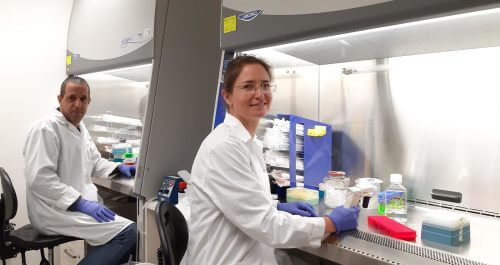Researchers at Ben Gurion University discovered that methylation is involved in determining the rate of cell division progression. Uncontrolled division of cells in our body is considered the main factor in the development of cancerous tumors

A new study carried out in the laboratory of Dr. Dan Levy, researcher bDepartment of Microbiology, Immunology and Genetics, and a member of the National Institute of Biotechnology in the Negev (NIBN), led by Dr. Michal Feldman, found a way to stop the process of cell division in the body, which can prevent the development of cancerous tumors and other diseases.
Methylation is an enzymatic reaction during which a methyl group (CH3) on DNA or proteins. Most of the studies dealing with it focus on the effect of this chemical group on the DNA. Recently, more and more indications suggest that methylation also directly affects the activity of proteins in the cell. The identification of cellular pathways controlled by methylation and of the enzymes that add the methyl group (methyltransferases) is of great importance not only in understanding basic processes in human cells but also in deciphering the development mechanisms of various diseases such as cancer.
The study, recently published in the journal Proceedings of the National Academy of Sciences of the United States of America (PNAS), showed that methylation is involved in determining the rate of cell division progression. Uncontrolled division of cells in our body is considered the main factor in the development of cancerous tumors. In this work, Dr. Feldman found that methylation of a central controller in cell division called PLK1 by the methyltransferase SETD6, regulates the speed at which cells divide. The findings of the study indicate that in the absence of methylation, the division controller PLK1 shows increased activity leading to an acceleration in the rate of cell division and consequently to a faster reproduction of the cells.
בDr. Levy's laboratory Currently engaged in studying additional processes involving protein methylation, such as: cell motility, programmed cell death, DNA damage control, fat cell differentiation, and more. These and other processes directly affect the development of diseases studied in the laboratory, including various types of cancer and metabolic diseases such as diabetes, fatty liver, obesity and more.
"The research carried out in the laboratory has significant implications for both basic and applied research and holds the potential to identify new therapeutic targets. Indeed, at the same time as these studies, the research team in the laboratory is engaged in the development of specific methyltransferase (SETD6) inhibitors. These inhibitors will be used in the future for the development of alternative treatment strategies that will hopefully enable the cure of various diseases in which SETD6 is involved," concludes Dr. Levy.
